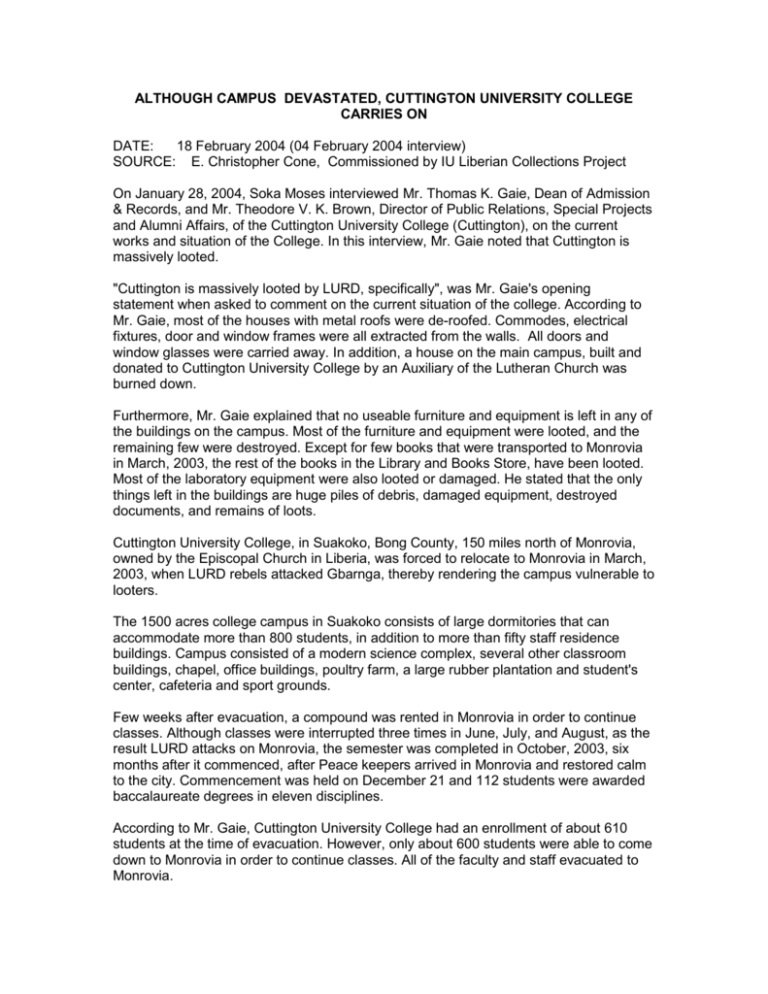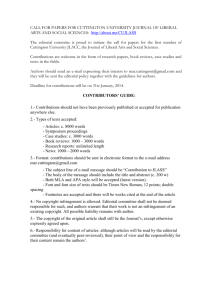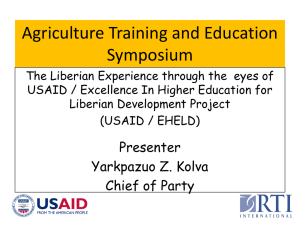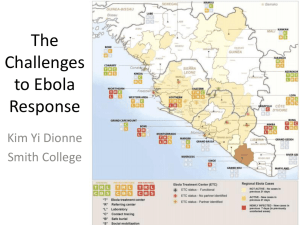although campus devastated, cuttington university college
advertisement

ALTHOUGH CAMPUS DEVASTATED, CUTTINGTON UNIVERSITY COLLEGE CARRIES ON DATE: 18 February 2004 (04 February 2004 interview) SOURCE: E. Christopher Cone, Commissioned by IU Liberian Collections Project On January 28, 2004, Soka Moses interviewed Mr. Thomas K. Gaie, Dean of Admission & Records, and Mr. Theodore V. K. Brown, Director of Public Relations, Special Projects and Alumni Affairs, of the Cuttington University College (Cuttington), on the current works and situation of the College. In this interview, Mr. Gaie noted that Cuttington is massively looted. "Cuttington is massively looted by LURD, specifically", was Mr. Gaie's opening statement when asked to comment on the current situation of the college. According to Mr. Gaie, most of the houses with metal roofs were de-roofed. Commodes, electrical fixtures, door and window frames were all extracted from the walls. All doors and window glasses were carried away. In addition, a house on the main campus, built and donated to Cuttington University College by an Auxiliary of the Lutheran Church was burned down. Furthermore, Mr. Gaie explained that no useable furniture and equipment is left in any of the buildings on the campus. Most of the furniture and equipment were looted, and the remaining few were destroyed. Except for few books that were transported to Monrovia in March, 2003, the rest of the books in the Library and Books Store, have been looted. Most of the laboratory equipment were also looted or damaged. He stated that the only things left in the buildings are huge piles of debris, damaged equipment, destroyed documents, and remains of loots. Cuttington University College, in Suakoko, Bong County, 150 miles north of Monrovia, owned by the Episcopal Church in Liberia, was forced to relocate to Monrovia in March, 2003, when LURD rebels attacked Gbarnga, thereby rendering the campus vulnerable to looters. The 1500 acres college campus in Suakoko consists of large dormitories that can accommodate more than 800 students, in addition to more than fifty staff residence buildings. Campus consisted of a modern science complex, several other classroom buildings, chapel, office buildings, poultry farm, a large rubber plantation and student's center, cafeteria and sport grounds. Few weeks after evacuation, a compound was rented in Monrovia in order to continue classes. Although classes were interrupted three times in June, July, and August, as the result LURD attacks on Monrovia, the semester was completed in October, 2003, six months after it commenced, after Peace keepers arrived in Monrovia and restored calm to the city. Commencement was held on December 21 and 112 students were awarded baccalaureate degrees in eleven disciplines. According to Mr. Gaie, Cuttington University College had an enrollment of about 610 students at the time of evacuation. However, only about 600 students were able to come down to Monrovia in order to continue classes. All of the faculty and staff evacuated to Monrovia. Mr. Brown clarified that "this is not the first time Cuttington Evacuated from its Suakoko campus". In 2002, when LURD attacked Gbarnga, Cuttington again relocated to Monrovia where the semester was completed. "During this first evacuation, Cuttington received financial assistance from the Government of Liberia and friends of Cuttington in the United States. The Government provided transport to facilitate evacuation, and accommodation for the academic programs. Resettlement allowance was made available by the friends of Cuttington, Mr. Brown further explained". According to Mr. Brown, Director of Public Relations, Cuttington University College has been faced with numerous financial related constraints in Monrovia. "Although we received financial assistance during our first evacuation in 2002, we received absolutely no assistance or support from any source this time around". He further explained that "it is only determination, perseverance and love for Cuttington University College by the diligent faculty and staff that have enabled the school to survive". He stated that although the faculty and staff were not paid their salaries for about five months in 2003, they remained committed to the college. "We worked not only for pay", he said. When asked to comment on the significance of Cuttington University College, Mr. Brown noted that in addition to being the oldest existing University College in Liberia, Cuttington was once celebrated as the "shining star of Africa". It received international students from many parts of Africa and other parts of the world such as Nigeria, Cameroon, Ghana, South Africa, Kenya, England, USA, etc. Some of our graduates are ambassadors, and education ministers of these countries. Furthermore, Cuttington participated in exchange programs with colleges, in the US, through which it benefited from international students and faculty. "This reputation was destroyed only because of the 14 years civil war", Mr. Brown said. Mr. Brown further explained that Cuttington University College is a member of a union of 105 Anglican Universities in Europe, America, Philippines, and Japan. It is also a founding member of the Association of African Universities (AAU). "As a matter of fact, Dr. Dominic Tarpeh, one of our graduates, is a senior administrative staff of the AAU. Also Dr. Herman Brown, the Special Assistant to the Bishop of Canterbury, is a graduate of Cuttington. Although Cuttington is the smallest university college in Liberia, it has the strongest faculty" Mr. Brown proudly stated. Masters programs in Education and Public health are to begin next month. Questioned about plans for returning to main campus in Suakoko, Mr. Gaie said "I don't know when we will return. But this will depend on support from Government and our friends to help rebuild Cuttington". He pointed out that benefactors of Cuttington, at home and abroad, have expressed interest in helping to rebuild Cuttington. According to him, this vision for the future is only a dream unless renovation is effected. Cuttington is presently operating from a rented compound in Monrovia. There is a current enrollment of more than 600 students. Mr. Brown believes that as peace returns to the war torn nation, "help will come from somewhere" For him, the priority for now is renovation and rehabilitation of the library, laboratories and few dormitories in order that Cuttington can return the provision of educational services from its campus. Commenting on the future of Cuttington in his conclusion, Mr. Brown confidently said that "We want Cuttington to be second to none in Liberia. We will work to maintain high academic standard in the midst of the harsh difficulties facing the institution. Our students must be able to cope with their counterparts in other parts of the world. We are inviting donors to come to our aid because we are ready to move beyond all obstacles in order that the college may survive". Mr. Brown's prayer is for financial support in order to renovate and rehabilitate the campus as the future of Cuttington depends on this.






